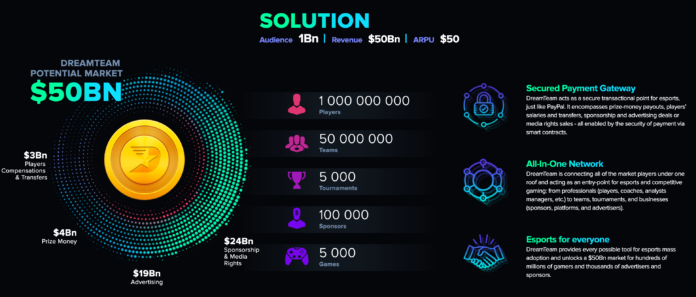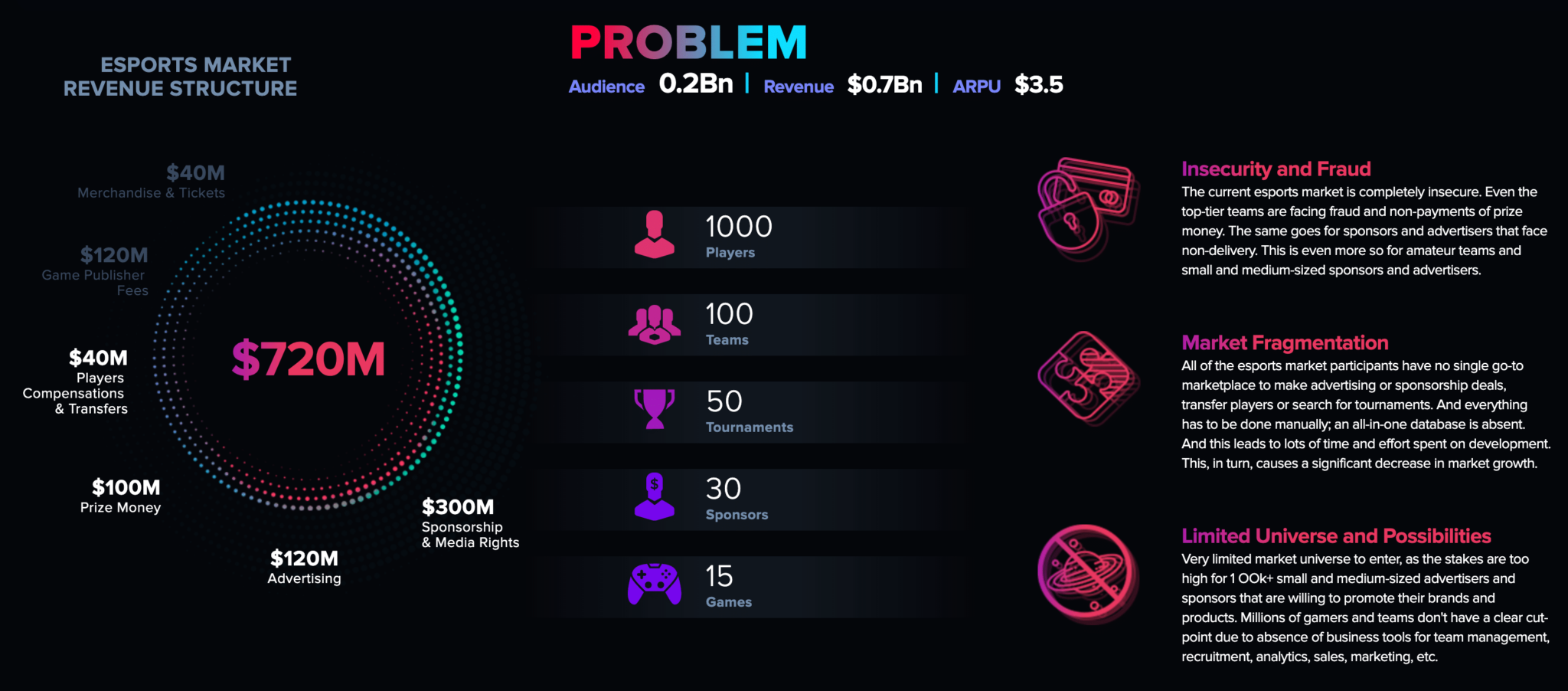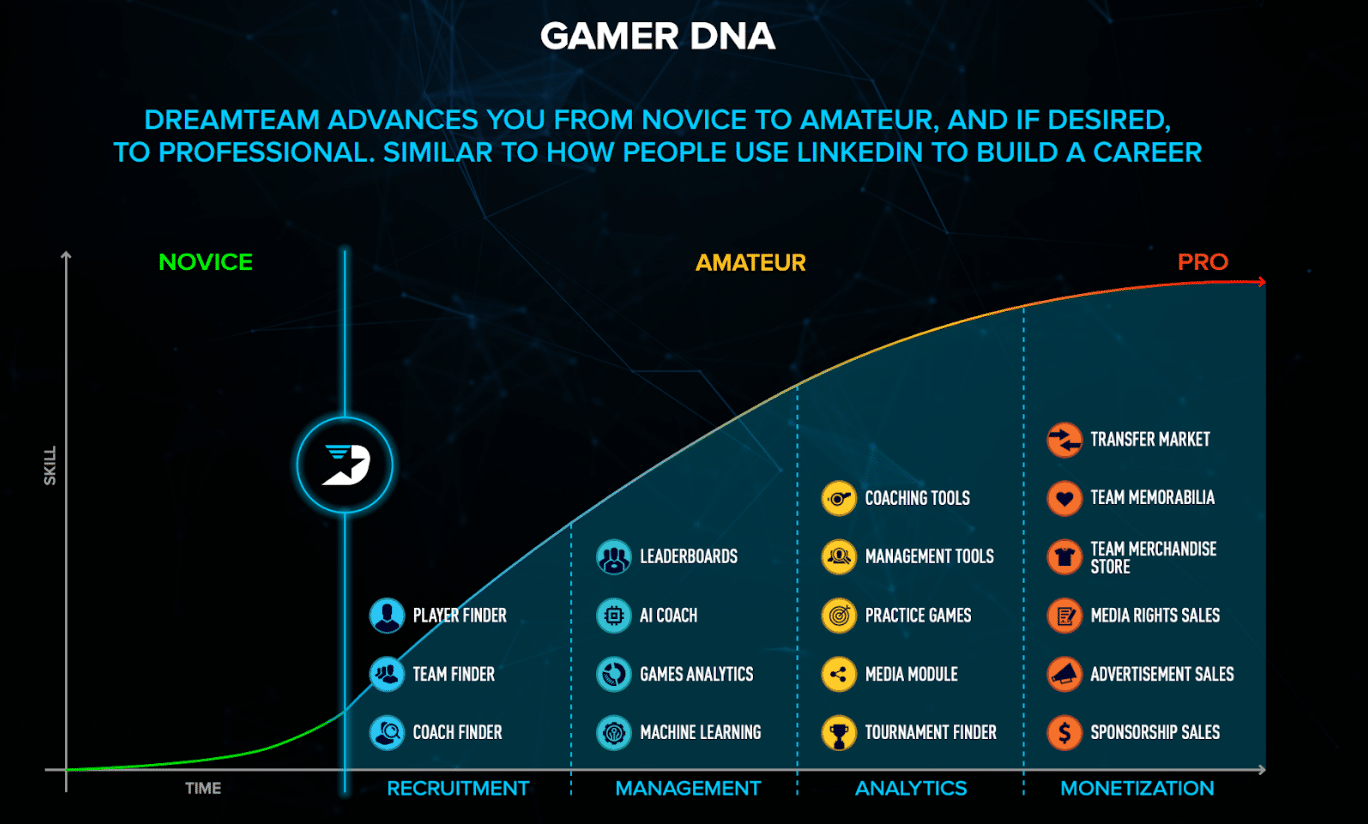
DreamTeam is an all-in-one infrastructure platform for competitive eSports gaming. The platform acts a secure payment gateway with the goal of making eSports competition much more accessible to anyone around the world who wants to compete.
DreamTeam aims to solve several pressing issues for eSports fans and players, such as secure salary payments and reception of tournament prize money via smart contracts. The company was founded on the ideals of creating a pure decentralized economic system based on P2P contact between users.
We connected with DreamTeam CEO and Founder Alexander Kokhanovskyy. Kokhanovskyy has 20 years of experience in the eSports industry and created Natus Vincere (Na`Vi), one of the most popular teams and successful teams in eSports history. In 2016, Kokhanovskyy became a shareholder of ESForce, which was acquired by Mail.Ru for $100m.
How are your CounterStrike chops today? Do you still got it?
I don’t really have the time to play much these days. However, I can say this, of course, I still have it. 🙂
What was it that drew you to start DreamTeam?
I’m a former gamer and have been in the esports industry for 20 years. I know it inside and out and from multiple angles: from an amateur to a successful professional player, coach, team manager, and CEO of the pro team NaVi. All of this experience has helped me understand the key pains of every esports player: how to form a team, how to find great teammates, coaches, managers, advertisers, etc., how to manage it all, and moreover, how to monetize and earn money. So, I came up with the idea to build one platform which can help solve all of those problems in a single place. That’s why I’m building DreamTeam, which is going to become the place which serves as the one and only point of entry for the entire esports industry and will give every single gamer the opportunity to reach their goals.
Let’s talk emerging tech. Blockchain, AI/ML, and VR/AR have the potential to completely transform gaming as we know it, and in some ways, they already have. Let’s fast-forward to 2029 – a 12 year old kid turns on his gaming console. How different do you think the gaming experience and industry will be?
Those technologies are already changing the gaming landscape. In 10-15 years gaming will move to AR/VR, people will no longer be sitting near their computers. The second technology that is revolutionizing the industry is mobile gaming. We already see mobile changing the way people are playing and using their devices. It’s become an obsession and people spend hours playing on the go. In terms of performance, mobile gaming loses compared to PC gaming.
But, from another point of view, as the number of mobile games grows, esports will continue to move from PC to mobile. We can now see that phones are already outpacing Console, Native PC, Tablet, and Browser games. Another technology is blockchain, which has huge potential at solving existing gaps in gaming.
At first, blockchain will become a solution for reducing the cost of microtransactions between users and game developers. The second point is that blockchain is the most secure way of making such transactions. It can help enhance trust between customers and the gaming market. We already see such projects on the market. Considering all of these, it’s actually really difficult to predict which gaming opportunities we’ll see 10 years from now. But for sure it will be different.
In March 2019, Snapchat, Walmart, and YouTube announced they were releasing gaming offerings and entering the industry. What impacts do you think this will have on the industry in general? How about for smaller platforms? How about for gamers?
Any time a large Player, meaning Walmart, Youtube, or any other well known and worldwide company that enters the market, it’s a great thing for esports. Those large companies have the connections and resources to reach hundreds of millions of people. So, by those listed companies getting into esports, the industry will benefit greatly.
In terms of the impact those companies will have on smaller platforms and gamers, I can’t really say at the current moment. It really depends on what they have planned.
What are your thoughts on the evolving battle royale formats like Fortnite and Apex Legends in terms of earning market share? Could you touch on what it takes for a gaming company to earn a significant market share in this industry?
With games like Fortnite and Apex Legends, we see meteoric rises in popularity. So, being first to the market helps a lot. However, that isn’t the most important thing. Obviously, you need to create an amazing product. You need to provide services and features that players want and need. And you need to think outside of the box in order to come up with features that can connect the community.
If you can do all of those things, you have a good chance of grabbing a significant percentage of the market. I think there is little room for more Battle Royale games. As there is no place for MOBA — everything there is for 2 games like Dota2 and LOL.
I think that in the next 2-3 years we will see new stages in the development of multiplayer games in new genres. But I will also definitely say that those games will be more for casual audiences than for hardcore ones.
Why tokenization and blockchain? Could you touch on what differentiates DreamTeam from similar offerings on the market?
DreamTeam Tokens were created with a goal of improving the entire esports ecosystem. Tokens combined with the latest blockchain technology solve a lot of pressing issues for esports fans like secure salary payments and the reception of tournament prize money payouts while avoiding common pitfalls like fraud and non-payment.

And all this can be done through the use of smart contracts. Sponsors and advertisers can be absolutely sure that the money will be paid only when their KPIs are 100% completed (be it some kind of advertising campaign, video views, etc.).
We believe that this is an ideal decentralized economic system, where there is no one responsible for your money, but only p2p contact between users. Speaking about other companies, yes we have some niche competitors. But companies on such a scale are absent in esports, as we are creating a unique combination of blockchain, AI, recruitment services, monetization options and much more. This is what makes DreamTeam stand out.
As a former amateur gamer, this image is pretty exciting. Unfortunately back then, eSports didn’t look like as lucrative as a career as it does now. Could you walk us through how DreamTeam plans to transform amateur gamers into pros?

As with any professional team sport, having two things is essential to winning: a great team and skills. DreamTeam is a platform that builds both. Until DreamTeam came along, it was very difficult for the average player to gain access to the tools that pro teams use. For example, the DreamTeam CS:GO Analytics tool. Teams can upload their games to our Analytics program which will analyze their game, also they can analyze any game to learn new Pro tactics or learn how to anti-strat their opponents. DreamTeam also has a feature called the DreamTeam Journey.
This feature walks users through the steps of finding teams and players, setting up practice games on free servers, using the training center and analytics tool, and so much more. By making everything more accessible, DreamTeam can help pave the path from amateur to pro for hundreds of millions of gamers.
What are your plans and channels for user acquisition? Then, how do you keep your users coming back?
Since the launch of the platform, we’ve used the following available channels for user acquisition: influencer marketing, SEO, search engines (Google, Bing), content marketing, partnerships, and sponsorship programs, etc.
The best way to choose the right channel is to test all of the possible regions and all of the possible instruments. Each channel works well depending on the goals, audience, geo, and other factors. Search optimization is one of the best channels in terms of traffic because people search and find us themselves.
To touch on partnerships and sponsorship programs, we’ve sponsored FACEIT Major London 2018 (CS:GO) and a couple of Starladder tournaments. We have partnerships with industry leaders like Na’Vi and Fnatic. We’ve received really nice results with influencer marketing, this was one of the main channels that helped us reach 1M users in less than a year.
As mentioned before, it was almost impossible to get access to the features that pro teams have and moreover to find all the needed features in one place. DreamTeam is changing this. We are creating a clear path for every player to reach their goals. And of course, adding new features and new games makes users come back to the platform.
What are the biggest challenges or milestones DreamTeam plans to hit in the near future?
For now our main focus is on the product itself, the marketing process is already set up. We are now working on developing the product in order to increase retention.To achieve this, we are constantly working on adding new and improving existing features for our main game on the platform — CS:GO. In addition to this, we’re looking for new markets and new games.
A couple of months ago, we launched Apex Legends — where users can track dynamic stats, see worldwide leaderboards, find and chat with players using the LFG feature, learn pro strategies with DreamTeam guides, and stay up-to-date on the latest news. Adding Appex legends also worked very well in terms of conversion.
To summarise, our biggest challenge is to understand how the work we’ve done can be implemented to other games added to the platform. In terms of business expansion, we are looking to the other markets. We see a huge potential in the Asian markets and we are now working on new partnership opportunities in order to launch in Asia in 2020.
How can a reader support DreamTeam?
The best way to support DreamTeam is to join our platform!:) As we are building the platform for the number 1 sport of the future. And we have no doubts that in 10-15 years esports will be bigger than all other traditional sports.
Thank you!
The post DreamTeam’s Founder on Tackling the $50BN eSports Market as a Startup appeared first on CoinCentral.

Coincentral.com is author of this content, TheBitcoinNews.com is is not responsible for the content of external sites.
Our Social Networks: Facebook Instagram Pinterest Reddit Telegram Twitter Youtube










